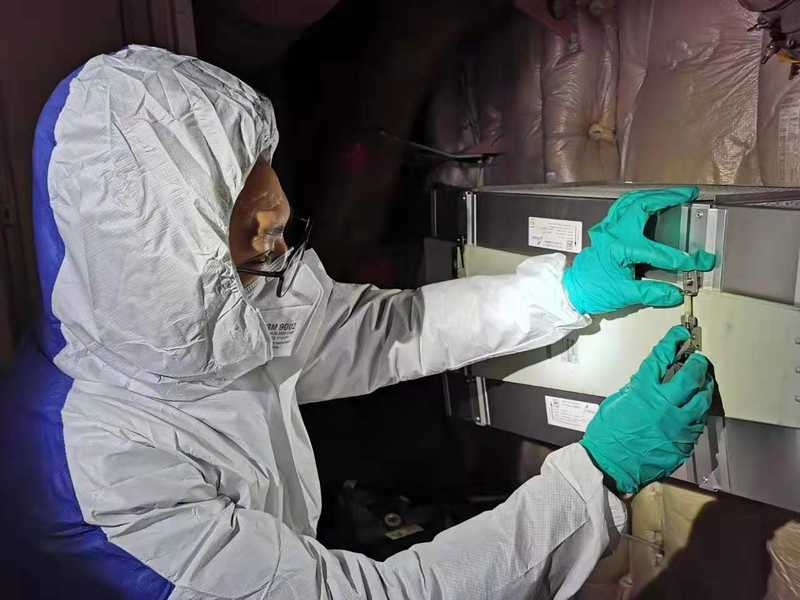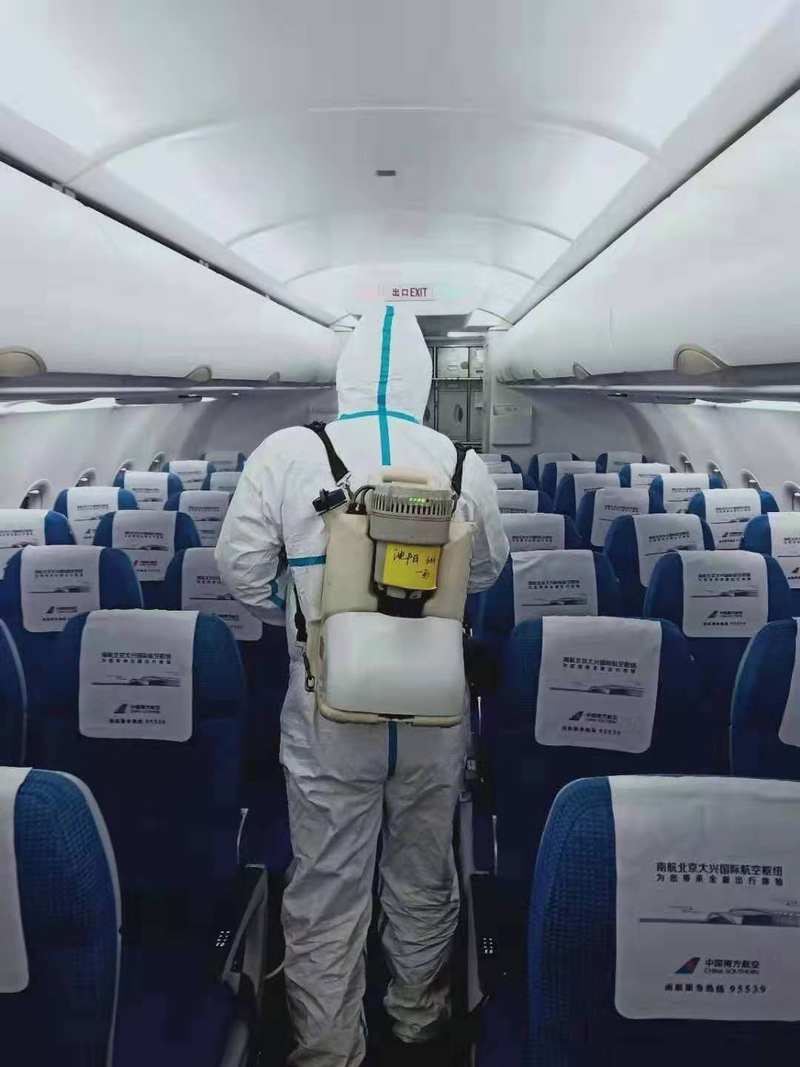Aircraft frequently change "masks" to prevent epidemic situation, and crew members wear protective clothing to change aircraft filter elements.
Beijing News (Reporter Wu Tingting) With the arrival of the return peak, airlines not only do a daily "physical examination" for their planes, but also increase the replacement frequency of the "air purifier"-high efficiency particulate air filter (hereinafter referred to as "air filter") during the epidemic prevention and control period, which is like putting a mask on the plane. The reporter learned that at present, almost every plane returned from the epidemic-prone area of various airlines needs to replace the air filter immediately to ensure the clean air in the cabin.
The frequency of air filtration for aircraft replacement is accelerated.
On February 3, the Civil Aviation Administration of China issued a notice, which made a number of requirements for epidemic prevention and control during the return trip. Among them, it was clearly proposed to clean the air conditioning system of the aircraft and increase the frequency of inspection and replacement of high-efficiency particulate air filters. In layman’s terms, HEPA is like an air purifier for home use, but this "air purifier" on the plane is more powerful than domestic equipment.
The relevant person in charge of China Southern Airlines said that this kind of air filtration on the plane can block the passage of 99.97% bacteria and virus particles, and the new filter material also has disinfection and sterilization functions. Sheng Liyao, director of the Fourth Workshop of Airbus Route Department of Hongqiao Maintenance Base of China Eastern Airlines Technology Company, introduced that the air in the aircraft cabin comes from two parts, one is fresh air, and the other is recycled cabin air, so the high-efficiency particulate air filtration can keep the air in the cabin fresh and clean.
Although the aircraft air filtration function is powerful, it still cannot be taken lightly in the face of epidemic prevention and control. Sheng Liyao said that since New Year’s Eve, all the planes of China Eastern Airlines flying to epidemic-prone areas and transporting medical staff to Wuhan and other places need to be replaced. Only today, in Hongqiao Airport, Sheng Lihao replaced the air filters for seven Airbus aircraft of China Eastern Airlines. "This does not include Pudong Airport and Boeing aircraft with air filters."
Liu Liwei, the relevant person in charge of the epidemic prevention and control office of China United Airlines, said that all the flights of the company returning to Beijing from the epidemic-prone areas will be replaced in time. "It used to be replaced regularly, but now it is changed when it flies back."
The relevant person in charge of China Southern Airlines also said that the cabin recirculation system of China Southern Airlines fleet is equipped with high-efficiency particulate air filter, and it is regularly replaced. The current effective measures are enough to ensure the air freshness and cleanliness of the recirculation system.

The crew members wear protective clothing to change the air filter. Photo courtesy of China Southern Airlines
The crew put on protective clothing to ventilate the plane.
Sheng Linghao told reporters that taking the Airbus model as an example, the Airbus 320 model has two air filters and the Airbus 330 model has eight air filters. With the increase of the frequency of replacing the air filter, the work intensity of the crew is also increasing, and in this special period, the crew also needs to wear protective clothing and goggles to replace the air filter for the aircraft.
On January 28th, Wu Yan, the release officer of China Eastern Airlines Technology Sichuan Branch, volunteered to disinfect three planes in depth and replace the air filter for the recirculation fan of the air conditioning system. Because of the special situation of the aircraft, it is necessary to minimize the impurities left in the air on the air filter, and the crew must be more cautious and careful.
Wu Mi recalled that he and Feng Zhang, the maintenance personnel, had carefully prepared for technical disposal and had in-depth exchanges with epidemic prevention personnel. Subsequently, they put on protective clothing, protective glasses, masks and gloves, and began to replace the air filter. The cargo hold of Boeing 737 is relatively closed, stuffy and unventilated, and the space is narrow, so it can only squat on the floor when working. When replacing the air filter, in order to make the impurities on the air filter not remain in the air as much as possible, they dared not be careless, and assembled and disassembled it more carefully and cautiously. With full preparation and superb technical ability, the work was completed one hour ahead of schedule.
The reporter also learned from China Southern Airlines that during the epidemic prevention and control period, all the crew members put on protective clothing to replace the air filter.

The staff disinfected the cabin. Photo courtesy of China Southern Airlines
The cabin is completely disinfected without leaving any dead ends.
In view of the return peak, the Civil Aviation Administration proposed to increase the frequency of deep cleaning and disinfection of aircraft cabins and cockpits. The reporter learned from many airlines, such as China Eastern Airlines, China Southern Airlines, Air China and China United Airlines, that all companies have formulated cabin disinfection plans. Take China United Airlines as an example. At present, the company has 52 flights at Daxing Airport. After disembarking on each flight segment, the flight attendants will disinfect the cabin models. In addition, China United Airlines also hired a professional company to deeply disinfect the aircraft, and has already deeply disinfected all flights. Liu Liwei introduced that because the cockpit is very important, the disinfection here is done by the crew.
During the epidemic period, the fleet of China Southern Airlines increased the frequency of disinfection and clarified the disinfection standards. The disinfection scope was stipulated in the plan, including aircraft cabin space, toilets, garbage rooms, etc., and detailed provisions were made in terms of disinfection personnel, medicines, equipment, protective articles, disinfection methods and procedures.
Air China’s fleet has also increased the frequency of disinfection. In the post-flight cleaning operation of each aircraft, preventive disinfection is carried out for every place that passengers and crew can touch, including cockpit, cabin small table board, seat armrest, porthole sun visor, luggage rack and toilet. In view of the fever passengers on the plane or the flight carrying out the emergency charter mission to Wuhan, after receiving the notice, the epidemic prevention personnel of Air China immediately boarded the plane to carry out atomization emergency disinfection of the cabin environment.
Beijing News reporter Wu Tingting
Editor Li Guojun proofreads Li Xiangling.